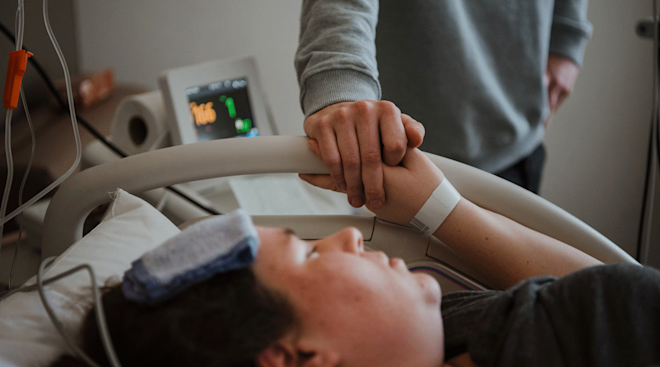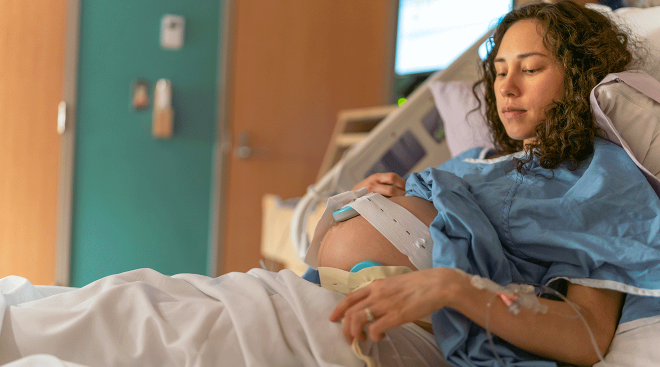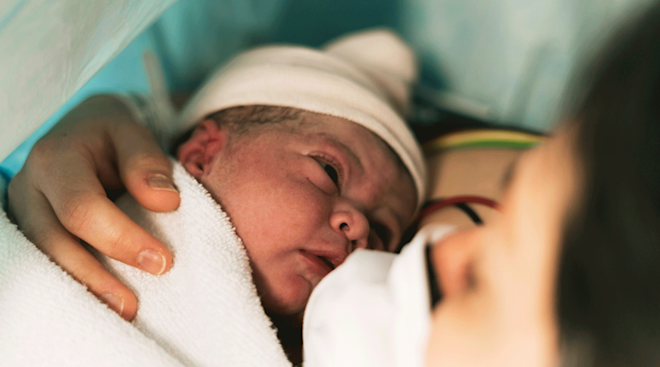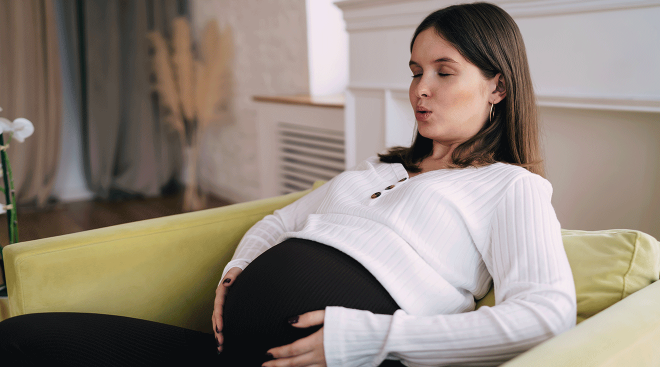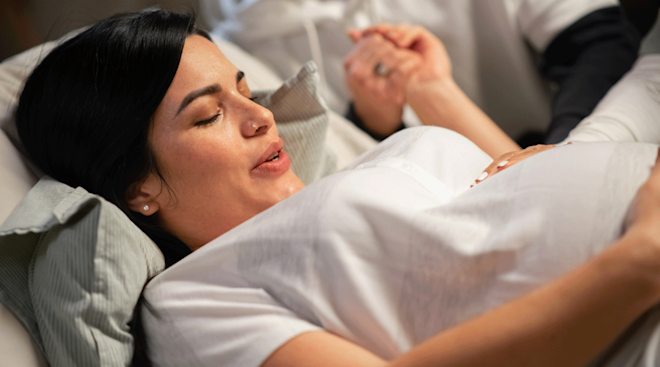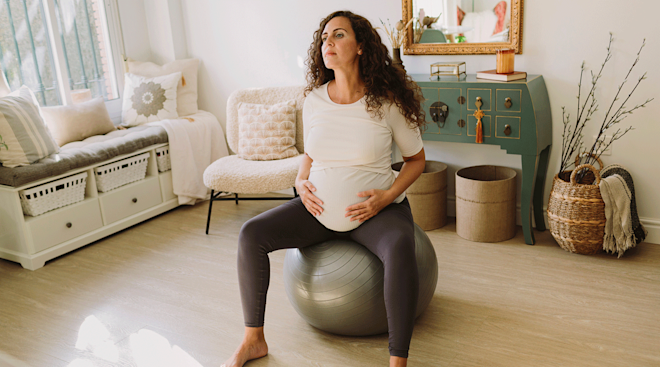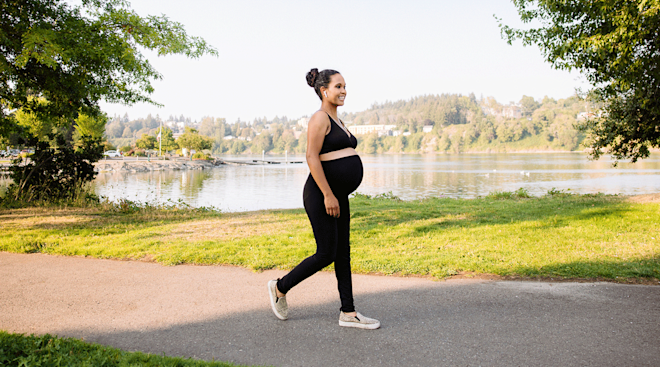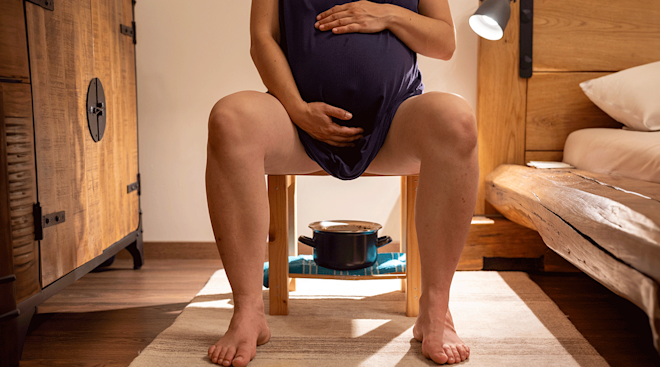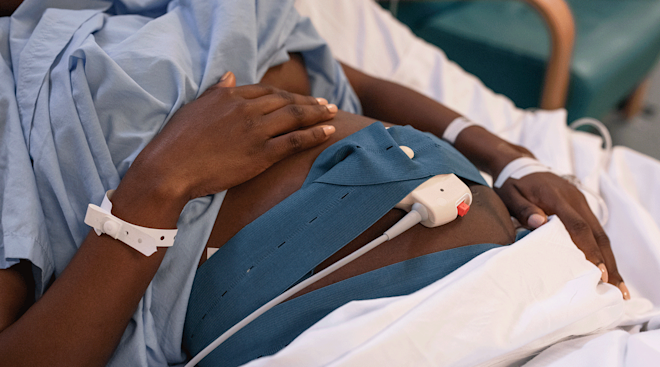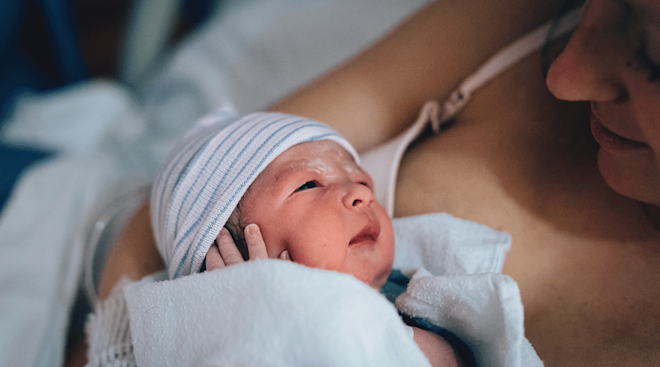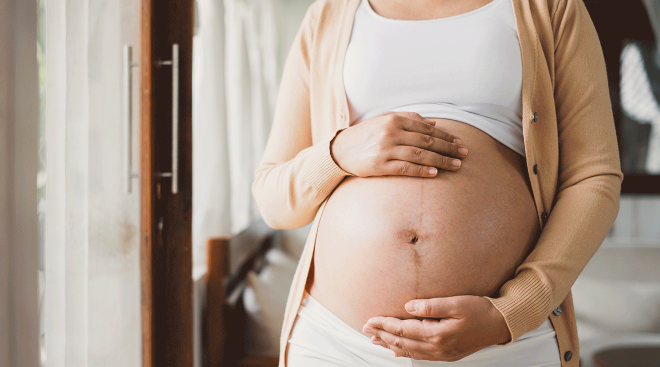What to Know About Planning for a Home Birth
Pregnancy comes with a lot of to-do’s, but perhaps one of the biggest is figuring out where you want to deliver and what you want your birth experience to be like. Intrigued by the idea of birthing at home instead of a hospital or birthing center? Keep reading for everything you need to know about home births, so you can make an informed decision that feels right for you and your family.
An at-home birth is the process of delivering baby at home, or another place that feels like home, says Rebekah Mustaleski, CPM, a certified professional midwife and compression director at Motif Medical. “I consider any birth that happens outside of a hospital or birth center to be a home birth. We’ve had people give birth at their house, their parent’s house, a friend’s house, in an RV, at an airbnb, at a hotel and in a yurt,” she explains. “When registering births with the state, all of those places are considered a home birth, but from a psychological perspective, the ‘home’ is wherever you feel most comfortable.”
There are two types of home births, says Chloë Lubell, LM, CNM, WHNP, a certified nurse midwife and founder of Cosmos Midwifery: planned home births and accidental home births, which happen when baby arrives before the birthing parent is able to get to the intended hospital or birthing center. (For the purposes of this article, we’ll be looking at planned home births.)
How common are home births?
The idea of birthing at home has been growing in popularity. According to a 2018 study, home births increased by 77 percent from 2004 to 2017. Data from the CDC shows home births have continued to rise due to the pandemic, hospital restrictions and strict COVID-19 policies. Presently, according to CDC findings, around 1 to 2 percent of births take place outside of a hospital.
While birthing at home isn’t all that common in the United States, Mustaleski says its popularity is much higher internationally. “Through the years, interest in home birth in the United States has gone up and down,” she says. “In other countries, like the Netherlands, home birth is much more common, with up to 20 percent of babies being born at home.”
According to the American Pregnancy Association, at-home births are best suited for people who have a healthy and low-risk pregnancy. Lubell adds that most of the research on home births focuses on singleton, low-risk pregnancies in which baby is in the ideal birthing position and the birth occurs between 37 and 42 weeks. “When assessing potential clients for my practice, I will not take people with known multiple pregnancies, history of chronic disease, fetal illness or abnormality that would make it safest for the baby to be born near a NICU, or other potential concerns,” Lubell says.
Mustaleski echoes this, adding, “If your pregnancy is high risk, it’s best for you all to be in the hospital where you can receive continuous monitoring and have access to the hospital’s team of care providers,” she explains.
So who should not opt for an at home birth? If any of the following might affect your pregnancy, experts say it’s best to deliver at a hospital:
- Pregnant with twins or multiples
- Preeclampsia
- Type 1 or 2 diabetes
- Gestational diabetes that isn’t controlled with diet and exercise
- Premature birth or preterm labor
- Cholestasis
- Prior c-section or hopes for a VBAC
- Taking any medications that increase your risk factors
- Wanting an epidural for pain relief
- Need for a labor induction
- Fetal growth problems, or any other known reason baby will need a neonatologist at birth
- Don’t feel entirely comfortable birthing at home and want the security of a hospital
To ensure you feel supported and safe during the birth, it’s also important to consider the opinions of your partner and other loved ones that will be present. “Homebirth is not something that couples can disagree on,” says Tanya Wills, CNM, IBCLC, a certified nurse midwife and founder of Manhattan Birth. “Everyone present at the birth must agree this is the best choice for this family.”
How are vitals monitors during a home birth?
Vitals for Mom and baby are monitored as they would be in the hospital, Lubell says. “We monitor the birthing parent’s vital signs with a blood pressure cuff, pulse oximeter and thermometer,” she explains. “Just like in the hospital, we monitor the baby’s well-being by listening to their heart rate and assessing its rate, rhythm and variability in relationship to their movement and the parent’s contractions.”
The main difference between how vitals are monitored during at-home births vs. hospital births, Wills says, is that some midwives may use a handheld ultrasound device called a Doppler, rather than attach the monitoring device to the birthing person by belt. “There are several benefits to this method, called intermittent auscultation,” she explains. For starters, Dopplers are usually portable and waterproof, meaning they can be used to monitor baby’s well-being in any position, even in the water. (Laboring in warm water is a common home birth technique that helps with pain management.) A 2017 study also suggests that intermittent auscultation, as opposed to continuous monitoring, may also lower the risk of c-sections in low-risk births without adverse outcomes. While more research is needed to understand the true benefits of intermittent auscultation, the American College of Obstetricians and Gynecologists (ACOG) does recommend the method for low-risk pregnancies that meet the criteria.
There are several reasons someone may want to give birth at home, and these will likely be personal and vary from person to person. Often, parents-to-be want more personalized care than hospitals may be able to offer. “Hospitals often handle thousands of births per year, and they have very specific systems set up in order to make things run smoothly for them,” Wills says. “At home, we are just taking care of one person at a time.” This can potentially lead to better outcomes for successful breastfeeding, postpartum recovery, decreased tearing, fewer interventions and more, she explains.
Research shows that “with planned home births under specific guidelines, home birth is as safe for babies as hospital birth, and as safe, if not actually safer, for birthing people,” Lubell says. According to three studies from 2014, 2015 and 2020, planned at home births among low-risk women have lower rates of maternal morbidity, operations and interventions, such as episiotomies and c-sections. Plus, the birthing person reported higher rates of exclusive breastfeeding and satisfaction with their experience.
According to Mustaleski, safe environments also promote the flow of oxytocin, a key hormone that helps encourage contractions. The flow of oxytocin can help the birth be a more straightforward and less stressful experience, she says.
According to the American Pregnancy Association (APA) and other experts, additional benefits of birthing at home can include:
- Feeling more safe, comfortable, supported, validated and in control
- Ability to recover at home and have postpartum care to come to you
- Ability to move around freely, take a shower, change birthing positions and eat or drink
- Potentially fewer interventions
- Can have as many family and friends present with you as you’d like
When home births are planned and attended by a qualified birth professional (like a midwife), research shows that there aren’t significant differences in the risks between birthing at home or in a hospital.
It’s important to note that, while maternal outcomes are generally positive for birthing at home, according to the 2015 review, neonatal outcomes might vary slightly. The review found that while home births were associated with lower rates of NICU admission, they were also associated with slightly higher rates of neonatal seizures and neurological dysfunction. The American College of Obstetricians and Gynecology also makes note of this in their guidance. While this sounds scary, the chances of this happening are incredibly low: the ACOG says it roughly occurs in 4 of every 10,000 births.
“The reality is that birth will always involve risk, whether you give birth at home or at the hospital,” Mustaleski says. “There is no way to completely eliminate the risks involved with childbirth.”
Hospital transfers
Even ideal candidates for home births may end up needing a hospital transfer—meaning moved to a hospital during labor for more extensive monitoring or treatment. According to Wills, the most common reason for hospital transfers is exhaustion. “Extremely prolonged labors can happen, and in those cases, an epidural is a welcome and humane tool.”
All three experts state at home births have around a 10 percent transfer rate and list the following reasons for hospital transfers:
- Long, slow labors in which the birthing person decides they want an epidural or pitocin augmentation to help labor progress
- High blood pressure
- Non-reassuring fetal heart tones
- The birthing person wants to transfer
- The home birth midwife or healthcare provider feels a hospital transfer is best course of action
“It’s important that folks who are planning homebirths live within close proximity to a hospital,” Wills says. “Planning for the possibility of a hospital transfer is part of prenatal care.” In fact, you may want to make a hospital transfer plan in advance, to figure out which hospital and practitioner you would want to be transferred to.
While hospital transfers can sound scary, they’re not just for emergency situations. “Seeing 10 steps ahead is a midwife’s job, so we can transfer care long before an emergency,” Wills says. If you do need a transfer, have your midwife call the hospital once the decision to transfer is made. “In my area, this really helps make the transfer process smoother, as we are able to go straight up to labor and delivery when we arrive and they often have a room ready for us to go to,” Mustaleski explains.
Seeing as this will likely be your first time meeting the hospital doctors and nurses, it’s also a good idea to print out your birth plan and preferences and keep both in a packed hospital bag. “If you’re in active labor, you probably won’t feel much like talking,” Mustaleski says. “Having a printed out copy of your birth preferences will make it much easier for the nurses to know what you do or don’t want for you and baby.”
Make sure you understand the care being offered to you and, most importantly, be open-minded. “You are safe,” Wills says. “It’s a different setting than the one we hoped for, but it isn’t a ‘failure’ or ‘bad’ or ‘hostile’ at all."
Unassisted home births
Unassisted home births are planned home births that are conducted without a medical professional present. There are a few reasons someone might opt for an unassisted home birth. “Perhaps they have a history of abuse, or felt violated by an obstetric provider, or witnessed something that makes them feel unsafe,” Wills says.
While Wills and Mustaleski believe in a birth person’s right to deliver however they wish, both agree that birthing at home can often be safer with the presence of a medical professional. Issues can come up in “seemingly uneventful deliveries,” including shoulder dystocia, postpartum hemorrhage and a baby that needs help breathing after birth. “These things happen with no warning signs, and they need immediate attention,” Mustaleski explains. “I never like having to be more hands-on and interventive, but I also know that’s the whole reason that midwives exist! We watch over you and help when needed.”
When putting together a home birth care team, you want to ensure you’re working with people you trust and feel comfortable with. To compile a list of midwives to interview, Wills recommends starting your research with recommendations, social media searches, reviews and reading midwives’ websites to learn about their approach and qualifications. While interviewing midwives, put together a list of the things that are most important to you. “Ask about their education, experience, their protocols, how they handle emergencies, what is included in their fee, what supplies they bring, etc.,” Mustaleski says, adding that you should feel empowered to interview any and all midwives in the area. “It’s really important for both you and for the midwife to make sure you are a good fit.”
You’ll need some basic household supplies to comfortably birth at home, Mustaleski says, including clean towels, a change of sheets and a stocked fridge. Your midwife will likely provide you with (or recommend you purchase) a home birth kit, many of which will have:
- Chux pads
- Gauze
- Gloves
- Peri bottle
- Postpartum pads
- Lubricant
- Alcohol swabs
- Umbilical cord clamp
- Bulb syringe
- Birthing pool (for a water birth)
Your midwife will bring any other equipment or medication needed to the birth. Just be sure to confirm with them the list of supplies needed and who will be providing what so you’re all on the same page.
How much a home birth costs will depend on your insurance and where you live, but birthing at home it’s generally cheaper than birthing at a hospital. Mustaleski says that prices in the US can range from $4,000 to $8,000, depending on where you live. Wills practices in New York City, where insurance, including Medicaid, usually covers a large portion of home birth costs. “People may have an out of pocket cost of $1,500 to $3,000 on average, but sometimes less,” she says. “Midwives provide payment plans, sliding scales and do all they can to make homebirth accessible to folks who want them.”
One of the draws of a home birth is it often offers more personalized care—including in the hours following birth. However, just as in hospitals, this care will largely depend on your care provider. Many home birth midwives stay with the clients for a few hours following delivery to ensure both Mom and baby are doing well. During these hours, the midwives will often:
- Assess your perineum to see if they have tears and need sutures. “If there is any bleeding, the midwife will use the same medications and techniques as the hospital, including IVs or pitocin. If sutures are needed (which they overwhelmingly usually are not), the midwife has lidocaine to numb the area and is skilled in repair,” Wills says.
- Provide an herb bath to promote healing
- Complete a thorough newborn exam and weigh them
- Offer you food and drink to ensure you can empty your bladder
Many midwives will take their assessments and complete their monitoring, while baby remains in your arms. “The golden hour is an important time for bonding for parents and baby, so we do all of our assessments with baby on Mom’s chest and do our best to be as unobtrusive as possible,” Mustaleski says.
After birth, many midwives check in between 24 and 48 hours later, slowly decreasing the frequency of check-ins until six weeks postpartum. During this time, they continue to remain “on-call” should anything come up between appointments, Mustaleski says. During the follow-up appointments, midwives will:
- Ensure baby is latching, eating well, bonding with Mom and adjusting to life outside of the womb
- File paperwork for baby’s birth certificate and social security card
- Offer follow-up care and monitor baby’s health over the next few weeks
While the midwives will provide a thorough newborn assessment, baby should also see a pediatrician following birth. Some midwives recommend bringing baby in for their first checkup as soon as possible after birth, while others suggest waiting a week, unless there are specific concerns. “Every pediatrician is a little different on when they want to see the baby,” Mustaleski explains. “Some want to see them ASAP and others are fine to wait until day 5 or 6 because they know the midwives are coming to check on them again that next day.” It’s best to confirm with your chosen pediatrician before the birth when they would like baby’s first appointment to be.
If you’ve decided an at-home birth is right for you and your family, there are a few things you’ll want to do to prepare:
- Put together a birth plan and a hospital transfer plan. Talk these through with your midwife, doula (if you have one) or partner prior to delivery
- Take a home birth class to get a better sense of what to expect
- Listen to birth story pregnancy podcasts to hear others’ experiences
- Come up with a labor pain management plan, especially if you intend to have an unmedicated birth
- Consider hiring a home birth photographer
How to cope when home births don’t go according to plan
Despite all the research and careful planning, ultimately birth is unpredictable, and the home birth may not go as you had hoped. Of course, it’s normal to feel disappointed and grieve the experience you had wanted, Mustaleski says—and your feelings are valid. “You can be glad that you and baby are safe and still be sad that it didn’t happen the way you wanted it to,” Mustaleski says. “None of us can guarantee birth outcomes. None of us can take away the unpredictability of birth,” she adds. “We need to respect the process, allow it time to do the work it needs to do and have the wisdom to know when we need to alter the plan.”
About the experts:
Rebekah Mustaleski, CPM-TN, IBCLC, is a certified professional midwife specializing in evidence-based maternity care. She co-founded Roots & Wings Midwifery in Knoxville, Tennessee. Mustaleski received her bachelor’s degree in psychology from Centre College and worked as a doula and birth photographer prior to establishing Roots & Wings.
Chloë Lubell, LM, CNM, WHNP, is a New York City-based midwife and the founder of Cosmos Midwifery. She became a certified nurse midwife at the Yale School of Nursing in 2014. She worked as a doula and at Bellevue Hospital before joining Central Park Midwifery, a private practice supporting births at Mount Sinai West, in 2017. She founded Cosmos Midwifery in 2019 to expand birthing options for pregnant people in New York City.
Tanya Wills, CNM, IBCLC, is the founder of Manhattan Birth, based in New York City. Shortly after giving birth to her son in 2008 she completed her initial birth and postpartum doula training with DONA International; holistic doula training with The Matrona; obtained her Certified Lactation Counselor credential with Healthy Children’s Center for Breastfeeding; and became a certified Sacred Birth Counselor. She received her Master of Science in Nursing from the midwifery program at Yale School of Nursing. She also received additional IBCLC training with Hudson Valley Breastfeeding while studying at Yale.
Please note: The Bump and the materials and information it contains are not intended to, and do not constitute, medical or other health advice or diagnosis and should not be used as such. You should always consult with a qualified physician or health professional about your specific circumstances.
Plus, more from The Bump:
Navigate forward to interact with the calendar and select a date. Press the question mark key to get the keyboard shortcuts for changing dates.





































